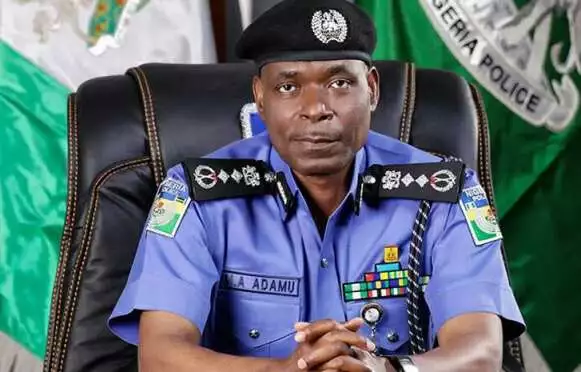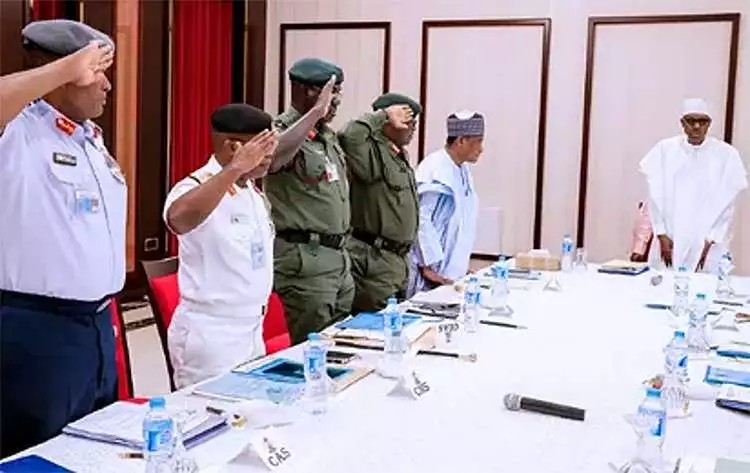Since he became Nigeria’s President in 2015, President Muhammadu Buhari has not been spared for making controversial appointments. But the extension of the tenure of Mohammed Adamu as the Inspector General of Police, IGP and the nomination of the immediate past service chiefs as non-career ambassadors have even made the situation worse for the president.
“President Muhammadu Buhari has forwarded the names of the immediate past Service Chiefs to the Senate as non-career Ambassadors-Designate,” presidential aide Bashir Ahmad disclosed in a tweet on Thursday
The president also cited the need to allow for enough time to select a new police boss as reason for extending the IGP’s tenure by three months.
The ambassador-designates are retired Defense Chief Abayomi Olonisakin, former Army Chief Tukur Buratai, former Navy Chief Ibok-Ete Ekwe Ibas and former Air Chief Sadique Abubakar. Their nomination is subject to confirmation by the National Assembly, the president said.
But many Nigerians insist that the appointment is not appropriate considering the antecedents of the former service chiefs as non-performers. By giving them new appointments, the president is saying he’s satisfied with their performance despite contrary views by the general public, the critics say.
According to this school of thought, the five year tenure of the former service chiefs were marred by the rising attacks of Boko Haram insurgents in Nigeria’s North East as well as armed banditry across the northern part of the country. For instance, the insurgents killed many innocent Nigerians within the period and have stepped up their attacks in many areas compared to when they were appointed in 2016. Considering that four local governments are still under the control of the insurgents, the critics of the administration insist that the former service chiefs failed in their assignment and appointing them to new roles meant they are being compensated for their failures.
Apart from this, it’s widely held that the reason for appointing the service chiefs is to protect them from alleged crimes they committed while in office. Some human rights groups in the country have petitioned the International Criminal Court in The Hague to prosecute Tukur Burutai, for instance, for alleged human rights abuses while he was the Army chief.
The opposition Peoples’ Democratic Party, PDP said “It is indeed sacrilegious and a horrible assault on the sensibility of Nigerians that the @OfficialAPCNg government is seeking to use ambassadorial appointments as desperate measure to secure diplomatic immunity for the former commanders and protect them from investigation, arrest and possible prosecution by the @IntlCrimCourt for the atrocities committed against innocent Nigerians under their command
“The @OfficialPDPNig asserts that appointing the former service chiefs as ambassadors would confer diplomatic immunity on them and provide them a route for escape,” the party said on Thursday.

Godwin Ogboyi, a rights activist says the long arm of the law will catch up with any former military chief that has committed crimes against humanity, no matter the effort by the Buhari’s administration to shield them from prosecution. “The concept of appointing them is based on the belief that the ambassadors designate have immunity and cannot be prosecuted,” he said.
But other experts say no prima facie case has been established against the former service chiefs. The allegation is an international conspiracy to discredit the former service chiefs despite their patriotic service to the country, according to supporters of the president.
For Adamu whose tenure expired on February 1, the critics of the president insist that he has breached the Police Act which stipulates that all police officers must retire at the age of 60 years or after 35 years in service, depending on the one that comes first. Adamu has served in the Nigerian Police for 35 years after joining the force in 1986.
According to Ebun Olu- Adegboruwa, a Senior Advocate of Nigeria, SAN the implication of Buhari’s action is that Nigeria presently does not have Inspector General of Police.
Citing the enabling Police Act the senior lawyer said “When the tenure of a serving IGP expires on the ground of completing the mandatory 35 years of service, he cannot be asked to continue in office beyond his mandatory tenure. An IGP who has served the mandatory years of service ceases to be a member of the Nigeria Police Force from the date of his completion of service. In this case, Mr Adamu ceases to be a member of the NPF from February 2, 2021.
“Under and by virtue of section 215(1)(a) of the Constitution and section 7(3) of the Police Act, 2020, only a SERVING member of the Nigeria Police Force can be appointed as IGP. Mr Adamu having completed his mandatory years of service in February 2, 2021, he cannot be appointed as IGP, from outside the force.
“The President lacks the power to reabsorb a retired police officer back into the NPF through a purported tenure extension, which is not contemplated by law. The President cannot appoint an IGP or extend the tenure of a retired IGP without the advice of the Nigeria Police Council, which in this case has not met to consider, let alone approve such tenure extension.”
On his part, Mike Ozekhome, SAN said the extension was an aberration. He said the president acted in breach of the law.
According to him “the president was wrong to have purportedly extended the tenure of Mr Adamu,” he said. Did he not see what just happened in America that we modeled our democracy after? Before Biden was sworn in on the 20th of January, he had already assembled his entire cabinet.”
He further described the president’s action “A fire-brigade approach and doing the things that are unconstitutional, illegal, unlawful, unconscionable, arbitrary, whimsical and capricious are the present acts of Mr President. The Nigeria police force is in a class of its own, that is sui generis. What do you mean by sui generis? It means that it is in a class of its own that does not go according to other laws, like the civil service rule; just like election petitions are sui generis and governed by electoral acts and electoral rules of procedures, and not by the ordinary service procedural rule that we know in our court,” he said.
“Section 7, sub-section 6 of the Nigeria police act 2020, what does it say? In very emphatic and categorical words, it says that the inspector-general of police shall serve for four years. Has Adamu served for four years? No. Could he therefore continue in office?t Why you go to section 18, sub-section 8 of the same Nigeria police act of 2020, it makes it clear, unambiguously, that the inspector-general of police shall retire from office when he would have served for 35 years, or he has attained the age of 65 years.”
Discover more from The Source
Subscribe to get the latest posts sent to your email.








